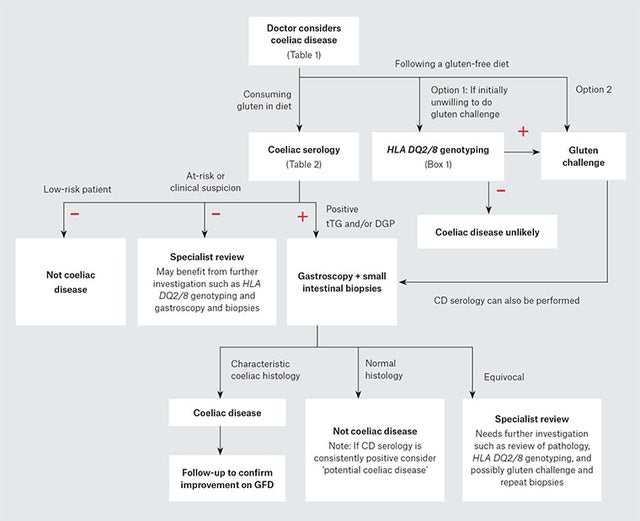- Comprehensive Blood Testing
- >
- Coeliac Screening
Coeliac Screening
SKU:
A$55.00
A$55.00
Unavailable
per item
Deamidated Gliadin Peptide Antibodies, Tissue Transglutaminase IgA, Total Serum IgA
Currently, serologic testing for coeliac disease consists of the transglutaminase (tTG) and deamidated gliadin peptide (DGP) antibody tests. In practice, both tests have >85% sensitivity and >90% specificity.12 The DGP assay has replaced the whole-protein anti-gliadin antibody (AGA) assay because of improved specificity; however, many labs will report the DGP result as the ‘anti-gliadin antibody’. The anti-endomysial antibody (EMA) test measures tTG antibodies, but is labour-intensive, user-dependent and less widely performed.
- Positive coeliac disease serology in isolation is insufficient for the diagnosis of coeliac disease.
- The higher the titre of serology, the greater the positive predictive value for coeliac disease.13
- Coeliac disease serology has a false negative rate of 10–15%.14 Check if your patient is on a GFD or taking immunosuppressants.
- The tTG normal range varies by manufacturer as there is no international standard. Comparing titres is not possible if different labs or tTG assays are used.
- In patients with risk factors for coeliac disease, negative coeliac disease serology has lower negative predictive value, so further work-up should be considered.15
- Point-of-care tests to detect coeliac disease antibodies have not been validated in primary practice, so cannot currently be recommended.11
- Patients with persistently positive coeliac disease serology but normal small intestinal histology may have ‘potential’ (or ‘latent’) coeliac disease, and follow-up is recommended.3,6
https://www1.racgp.org.au/ajgp/2018/january-february/interpreting-tests-for-coeliac-disease-1
